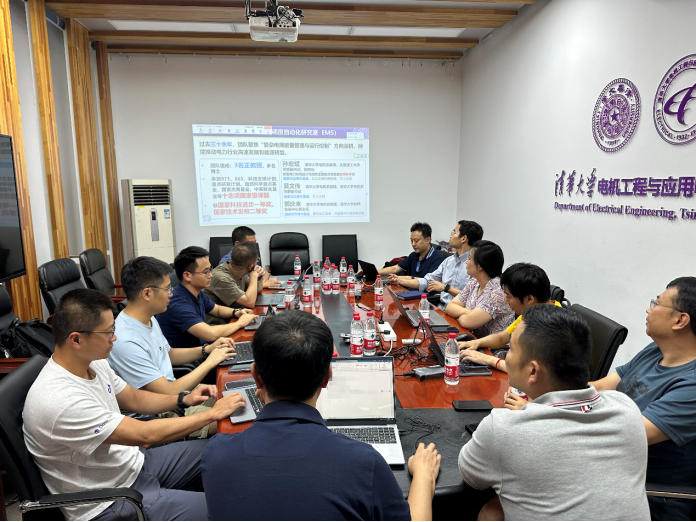On the afternoon of July 19, a collaborative discussion on the “Computing Power-Electricity” development path took place at the West Main Building of Tsinghua University. Participants included representatives from the Department of Electrical Engineering and Applied Electronics (EEA), the Energy Internet Innovation Institute of Tsinghua University, VNET, and Douyin Vision Company Limited. More than 30 individuals from the Power Dispatch Automation Research Office of EEA, the Chain Network Center of the Energy Internet Innovation Institute, the Energy Business Unit and Solution Center of VNET, and the Data Center of Douyin Vision Ltd. attended both offline and online, engaging in enthusiastic discussions.

At the discussion
During the discussion, Chen Min from the Power Dispatch Automation Research Office of EEA delivered an academic report titled “Collaboration between Computing Power and Electricity: A Flexible Combination of Data and Computing, a Multi-Port Virtual Power Plant.” Starting from the physical model of computing power and electricity collaboration, the report focused on the overarching goal of the “collaboration between computing power facility energy management and the transfer of computing power demand in time and/or space, wherein data centers provide load adjustment capabilities in the time and/or space dimensions for the new-type power system.” The report provided a detailed overview of expected economic and social benefits, current domestic and international situations, key challenges, research achievements of the team, feasible paths, and implementation plans regarding the collaboration between computing power and electricity. Following this, Zhao Haotian from the Power Dispatch Automation Research Office of EEA introduced the successful applications of team-distributed resource virtual power plant technology, park-level IEMS (Integrated Energy Management System) virtual power plant technology, and city-level IEMS virtual power plant technology in events such as the Winter Olympics in Science and Technology, China Tower Corporation, Ganghua Group, Beijing North Science Park, Guangzhou Conghua Mingzhu Industrial Park, and Changchun City in Jilin Province.
The attending representatives fully acknowledged the high-tech value and economic and social benefits of the collaboration between computing power and electricity for constructing a new-type power system and green low-carbon computing power system. They highly recognized the universality and low-cost feasibility of the feasible paths and implementation plans for the collaboration between computing power and electricity. Concurrently, the attending representatives jointly expressed the significance of collaborative efforts between research institutions and industries to advance the collaboration between computing power and electricity. They engaged in an in-depth exchange on jointly building a demonstration project for the collaboration between computing power and electricity that is highly scalable, innovative, and beneficial to the economy and society.
The next step will involve delving deeper into practical computing power, defining boundary conditions, identifying suitable business scenarios, early-stage implementation plan assessments, and conducting joint experiments. Real-world business scenarios will be used to validate the economic and social value of the collaboration between computing power and electricity.

















 News & Events
News & Events